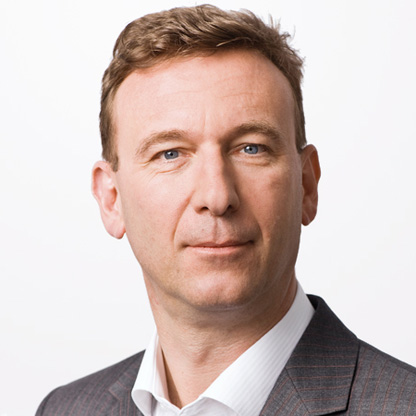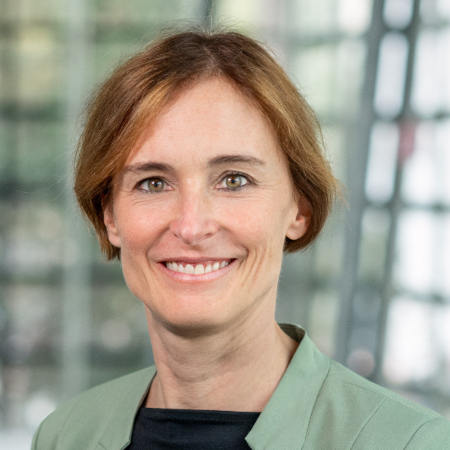From funds to firms
Jörg RiesmeierProfession:
Biochemist
Position:
Managing director of Derivo ITB in Cologne

Profession:
Biochemist
Position:
Managing director of Derivo ITB in Cologne

Jörg Riesmeier already worked as biochemical scientist as a well as a fund manager. In his recent years, he helped putting the industrial biotechnology-specialised company Direvo on a new course.
Since 2010, Jörg Riesmeier’s first responsibility has been as managing director of the Cologne-based biotech company Direvo IBT. However, the 48-year-old biochemist already established his credentials as a company head some years ago. In 2006, after finishing his degree studies and completing a lightning-fast doctorate in Berlin (“two years and ten days”), he was one of the founders of the Potsdam-based plant biotech start-up PlantTec, as well as its first managing director.
It’s the mid-1990s. At the tender age of 32, Jörg Riesmeier has just been made CEO of the small start-up PlantTec. Not everything goes smoothly in these early days, and “more than once” he is enraged by attitudes of his business partners: “Just because they could present a business card embossed with the name of a large German company, they thought they had a monopoly on wisdom!”
A rapid rise
Over time, gives Riesmeier managed to gain the respect of his peers, also as a result of “some plain talking outside of the meeting rooms.” There was an element of fortune in how the native of Lower Saxony arrived at his post. At the Max Planck Institute (MPI) for Molecular Plant Physiology in Potsdam-Golm, Lothar Willmitzer and his team (including Riesmeier) were working hard on strongly application-oriented projects. This did not fit into the general concept of the institute. So, should the work be binned or spun-off? The biochemist Riesmeier had already earned a doctorate under Willmitzer’s supervision, and at the age of 28 had followed him to the Institute of Gene-Biological Research in Berlin in the role as a junior group leader. When the institute closed down, he remained in the capital to work on his doctorate, this time at the MPI. With a career that was progressing at such a tempo, it seemed only logical that he would be offered the top position at the newly founded PlantTec GmbH. Riesmeier was happy to step up to the task, and began to build up the Potsdam-based company at the intersection between green and white biotechnology. In 2000, PlantTec was acquired by Agrevo, who soon renamed it Aventis CropScience, before selling it again to Bayer AG in 2002. During this time, Riesmeier expanded the company’s Hermannswerder Island location to 70 employees. The legal form of the company was changed at the end of 2003 – for Riesmeier, there was little left to do that offered him the necessary challenge. Bayer took over the location as Bayer Bioscience up to 2008, after which the projects were transferred to the US and Belgium, leaving the greenhouses in Potsdam empty.
Easy Californian flair
Back then, there was a tendency in the sector that was taken as fact: “Green genetic engineering was deemed to have failed in Germany,” says Riesmeier. During his role as fund manager, he even moved his family to California. It was the right decision: “There’s a fantastic vibe on the west coast. And the business climate – it was made for me!” Inspired by the pioneering spirit, the next challenge was already waiting in Boston, namely the organisation of the Dutch LSP BioVentures fund. The money came from Syngenta, which was hoping to be early to cash in on the clever ideas emerging from industrial biotechnology. It was a successful approach. After the initial investment – mediated by Riesmeier – in 2012 the Swiss Syngenta purchased a company “somewhere deep in the hinterland of Florida” for a whopping $113 million. By this time, the multi-talented Riesmeier was already back in Germany. The reason he gives for this is the extremely weak global financial situation and the consequent reluctance among the usual financial backers to part with their cash. “By 2008, the situation was dire. The investor business was no fun anymore,” remembers Riesmeier.
A revolution at Direvo
As is so often the case, there was a strong element of luck. Direvo Industrial Biotechnology (IBT) GmbH in Cologne was on the lookout for a new CEO. The pharmaceutical was flourishing at Bayer after the hiving-off of the industrial biotechnology division from Direvo Biotech AG. Ex-head Thomas von Rüden briefly took over the helm at Direvo IBT and re-established contact with Riesmeier, who he knew from earlier days. Riesmeier was already familiar with the company: “We had had an eye on Direvo at LSP, but were not yet minded to make an investment.” Of course, the newly crowned head was also aware of this, and knew that there was work ahead of him in Cologne: “We totally revamped the company.” Three years later, the firm is doing very well and has 30 employees and two main products on its books. BluZy enzymes utilise as feed the waste produced by bioethanol production, while the BluCon platform guarantees the conversion of organic waste into economically viable individual building blocks such as lactic acid.
Weekend experiments only in the kitchen Berlin is now home once again for the Riesmeiers family. “After our stretch in the US we wanted to be on familiar territory again, above all for the kids.” During the week, Riesmeier stays in a small rented apartment in Cologne. The weekends are often spent, in his own words, as an “experimental amateur cook”. His testers are Mrs. Riesmeier and his six and eleven-year-old sons in Berlin-Zehlendorf. Although they can’t quite explain what it is that dad does during the week, they have both declared that they also want to be inventors when they grow up.
Author: Martin Laqua


